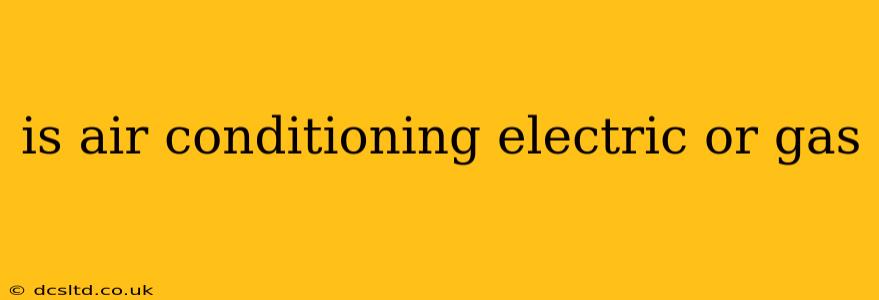Is Air Conditioning Electric or Gas? Understanding Your Cooling Options
The simple answer is: air conditioning systems can be electric, gas, or even a combination of both. The best option for you depends on several factors, including climate, budget, energy efficiency goals, and the type of fuel readily available in your area. Let's delve into the details of each type.
What are the different types of air conditioning systems?
Most homeowners are familiar with electric air conditioning, which uses electricity to power a compressor that cools refrigerant. This refrigerant absorbs heat from inside your home and releases it outside. Electric AC units are widely available, relatively easy to install, and generally more affordable upfront.
Gas air conditioning systems, on the other hand, use a gas furnace to heat the air for your home, and the system then utilizes a heat pump to reverse this process for cooling. This type of system uses natural gas or propane as its primary fuel source and can be very energy-efficient, particularly in climates with mild winters. However, the initial installation cost is typically higher than electric systems.
Beyond the fundamental electric and gas options, you'll also find heat pump systems. These systems can operate as both heaters and air conditioners, moving heat instead of generating it. While they are usually electric, they boast high energy efficiency and can significantly reduce your overall energy consumption. Certain heat pumps utilize a refrigerant capable of functioning effectively in extremely cold temperatures, ensuring efficient cooling and heating year-round.
What are the pros and cons of electric air conditioning?
Pros:
- Widely available and affordable: Electric AC units are readily available and generally less expensive to purchase and install than gas systems.
- Easy installation: Installation is typically simpler and faster.
- Quiet operation: Electric systems tend to be quieter than gas units.
Cons:
- Higher energy costs: Depending on your location and electricity prices, operating costs can be higher compared to gas or heat pump systems, particularly during peak demand periods.
- Reliance on electricity: Power outages can render electric AC useless.
What are the pros and cons of gas air conditioning?
Pros:
- Potentially lower operating costs: In areas with affordable natural gas, operating costs can be lower than electric AC, especially during prolonged periods of use.
- Reliable heating and cooling: Often integrated with a gas furnace, offering a comprehensive solution for year-round climate control.
Cons:
- Higher initial investment: The initial cost of installation can be significantly more expensive.
- Requires gas lines: Installation requires access to a natural gas or propane line.
- Potential for higher maintenance: Gas systems may necessitate more frequent maintenance than electric systems.
Which type of air conditioning is more energy efficient?
Energy efficiency varies significantly depending on the specific system, its age, and your climate. Modern heat pumps, capable of both heating and cooling, often rank highest in energy efficiency. However, gas air conditioning can be more efficient than electric in areas with low natural gas prices, and extremely well-maintained, energy-efficient electric air conditioners can also compete. The best way to determine the most energy-efficient option for your home is to consult with a qualified HVAC professional who can assess your specific needs and energy costs.
How much does it cost to install an air conditioning system?
The installation cost depends heavily on several factors, including the size of your home, the type of system you choose (electric, gas, heat pump), and the complexity of the installation. It's crucial to obtain multiple quotes from reputable HVAC contractors to compare prices and services. Don't forget to factor in the ongoing operational costs, which can vary significantly based on energy prices and system efficiency.
By carefully considering these factors, you can choose the most suitable and cost-effective air conditioning system for your home and climate. Remember to consult with a qualified HVAC professional for personalized advice and accurate cost estimations.
